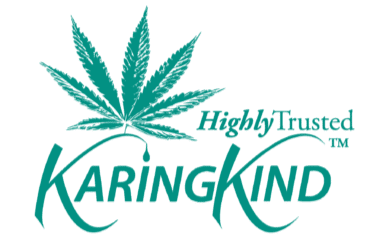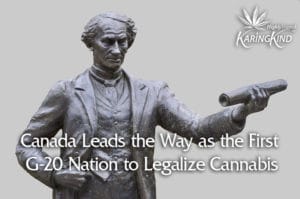This week, Canada’s Parliament voted to legalize recreational marijuana by a nearly two-to-one margin.
It’s pretty big news.
I mean… it’s HUGE news.
With the vote—and the final go-ahead from Prime Minister Justin Trudeau—Canada is set to become the first G-20 nation in the world to legalize recreational marijuana (Uruguay ended pot prohibition in 2017).
The law will go into effect on October 17, according to Trudeau, which gives local provinces almost four months to prepare for the first week of sales.
That doesn’t seem like a lot of time… at least not when compared to the long turnarounds we see in the U.S. When Colorado legalized recreational cannabis, the first joints weren’t available for sale for another 14 months.
Canada legalized medical marijuana in 2001, so they aren’t starting from scratch. But, they still have their work cut out for them.
Here’s what we know about Canada cannabis so far.
Reasons to Legalize
Prime Minister Justin Trudeau has argued that legalization is a path to eliminate the illegal cannabis industry that had bloomed to an estimated $7 billion a year.
Many illegal retail locations have popped up, presenting themselves as licensed medical dispensaries. And while police have shut down some shops, new ones seem to open just as quickly.
On top of physical retailers, many legal growers sell surplus crop to illegal websites that turn around and sell the product online.
One of the reasons Canada has such a large black market is that medical marijuana patients in Canada are required to order weed by mail from licensed producers. If someone needs weed fast, their only option has been to visit a black market dispensary.
Given the size and range of the black market, it just isn’t practical—or possible, given limited resources—to keep policing cannabis to such a degree.
So, our Northern neighbors have decided on a new direction: legalization.
What Do Canadians Think About the Move to Legalize?
As you’d expect, responses to the new legislation have been mixed.
Meanwhile, some conservatives opposed to the policy fear the worst. Former radio host, Mr. Letendre, had a particularly… excessive… vision for the future. “Young people from all over the world will come to smoke weed in Montreal, and we will soon become a country of potheads.”
The same fears were echoed in Colorado when voters approved Amendment 64 in 2012. People worried the state would be overrun by potheads.
Of course, those “potheads” started legal retail and medical shops that drove over $1.5 billion in sales and employed nearly 18,000 full-time employees in 2017. Those “stoners” are credited with 5.5 percent of the state’s employment growth in the first half of 2017. The people smoking weed in the state contributed $40 million in excise taxes to the Building Excellent Schools Today school construction program. And, tax revenue goes toward funding regulation, licensing, law enforcement, treatment services, and much more.
That could explain why so many young entrepreneurs see the move as an opportunity—not just to get high with impunity, but to capitalize on a new industry with incredible growth potential.
There will certainly be growing pains as the nation rolls out legal weed. But, an influx of motivated marijuana entrepreneurs shouldn’t be one of them. These businesses are a boon to the economy, not something to be feared.
How Will Canada’s Pot (and Pot Laws) Differ from the U.S.?
Buying weed in Canada won’t feel like it does in Colorado.
For starters, the legal age to buy alcohol and cannabis is 18—its 21 in the U.S.
The Canadian government will also be involved in distribution and sales, and cannabis companies will be able to access national banking services as well as secure loans.
And, per the current process of ordering medical marijuana online, recreational consumers will be able to order online and have cannabis delivered to their home in the mail.
With only four months to prepare for the first day of sales, it’s up to each province and territory to decide how they will handle distribution and sales.
As NBC News reports, Ontario plans on opening 150 stores, to be run by the Ontario Liquor Control Board. British Columbia is planning on a mix of public and privately owned stores. Newfoundland and Saskatchewan will only have private shops. And, in some cases, marijuana may be sold at existing liquor stores.
Provinces will also be able to determine their own policies on whether or not to allow home-grows. In Quebec, home-growing will be banned entirely, while may other provinces will allow up to four plants in a private residence.
With so many different strategies to implement and monitor cannabis, new marijuana companies are figuring out how to sell cannabis in a way that follows the various regulations that will be in place.
For example, restrictions forbid “glamorizing” marijuana in marketing, which is a pretty big hurdle to jump over. Good marketing is traditionally designed to make a product seem appealing, after all.
Additionally, dispensaries won’t be allowed to show marijuana to customers, even if it is in a glass display case behind a locked counter. Instead, marijuana will be sold in sealed sachets, and customers will be able to smell the marijuana before buying—like perfume.
All cannabis sold in Canada—whether from a public or privately owned shop—must be obtained from federally licensed growers. More surprising, officials will set the minimum price (likely between $6-10/gram).
Even taxes will work differently. The current plan is for the government to tax legal cannabis at a rate of $1 per gram or one-tenth of the product’s price, whichever is greater. Even when you tack on federal and provincial taxes, the rate is likely to be much lower than those you find in the U.S.
Growing Pains: Challenges Still to Be Addressed
While cannabis is about to go on sale in Canada, consumers will only be able to purchase dried flower, cannabis oil and seeds.
Edibles—one of the fastest growing markets in the Colorado cannabis industry—won’t be available for another year.
Given the difficulty Colorado had regulating edibles in the first year of sales, this feels like a strategic—if frustrating—decision.
Labeling requirements are also likely to go through several changes in the coming months and years. Currently, Health Canada requires large warning labels on relatively plain packaging. Stipulations about font size, style and colors are designed to discourage misuse, just like warning labels in the U.S.
Unfortunately, the current labeling requirements leave little room for companies to include their logos or branding. And, according to Chris Clay, the owner of Warmland Cannabis Centre on Vancouver Island, “It looks like each bag is housing radioactive waste.”
While the regulations are well-intended, they could make it hard for smaller shops and new businesses to make a name for themselves.
In the U.S., concerns appear to be primarily focused on trade and border states. The move to legalize cannabis at a national level flouts treaties that bar legalization, and could strain already tense trade relations between Canada and the U.S.
It has long been a tradition in many states for 18 year olds to travel to Canada to take advantage of their lower drinking age. It stands to reason the same will hold true with cannabis.
Border states where pot is still prohibited include Idaho, Montana, North Dakota, Minnesota, Michigan, New York, and New Hampshire.
Despite the potential growing pains, Canada is ready to move forward with legal recreational cannabis. And, given the range of strategies to implement and regulate the new industry, we could see some of the best case studies yet about how to legalize recreational cannabis safely and efficiently.
Maple Leaf. Pot Leaf. Why Would You Ever Leaf?
By legalizing marijuana at a national level, Canada is forcing other nations to reconsider their policies. And by leaving regulations and implementation largely up to provinces, they’re providing the data other countries (and U.S. states) will need to make confident decisions about legalization.
Celebrate the first G-20 nation to legalize recreational cannabis with a gram of clean-grown bud or naturally-extracted CO2 oil from Karing Kind, Boulder’s first recreational marijuana dispensary.
Karing Kind is located just off of US-36, one mile north of Broadway, open MON-SUN from 9am to 10pm.
While we carry a variety of strains, concentrates, edibles, salves and tinctures, inventory and stock levels fluctuate from week to week and month to month. Check our menu and follow us on Twitter for an up-to-date list of edibles, concentrates and buds available.



